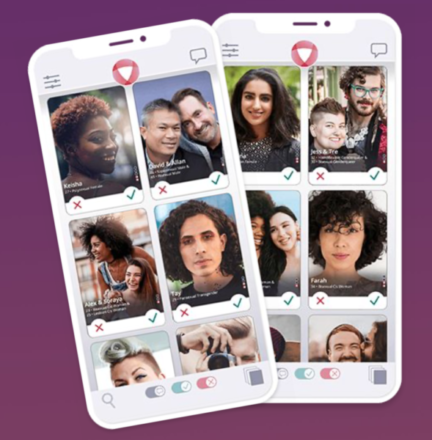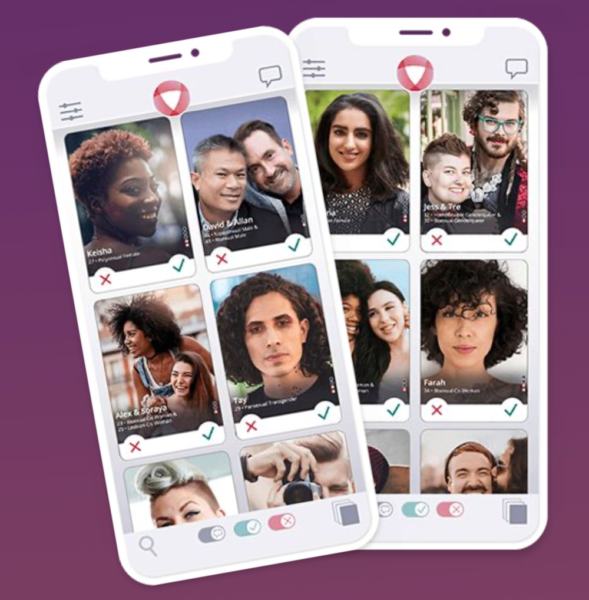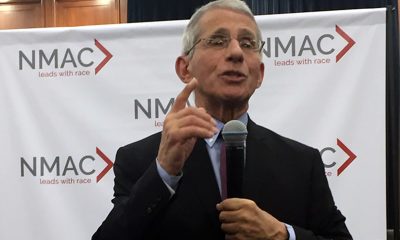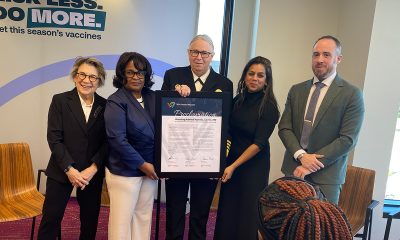Arts & Entertainment
Dating app #open offers free virtual sex-ed class to help ease the ‘self-isolation’ blues


While self-isolation and staying “safer at home” are undoubtedly the right thing to do for the overall health and well-being of ourselves and the larger community, they aren’t necessarily great for our sex lives.
With efforts to “flatten the curve” on the spread of COVID-19 already stretching out into weeks, many single and non-monogamous people – or even monogamous couples, if separated by circumstance during the quarantine – are sure to be feeling the call of their libido. Rather than giving into the potentially catastrophic temptation of risking an in-person meet-up, many of those with the urge to get their groove on are turning to the many options for remote connection available to us in the age of smart phones and video conferencing.
While the virtual approach to shared sexual experience may be familiar enough for many of us, there are also many for whom it is a challenging journey into unexplored territory – and in terms of finding a meaningful connection that goes deeper than an impersonal and anonymous hook-up. Rather than letting that be an obstacle to participation in a little sexual self-care, why not get a few tips from an expert so you can be ready to dive in with confidence?
To that end, #open, a dating app for women and other marginalized groups including people seeking open or polyamorous relationships, has partnered with sex and relationship educator Sarah Sloane to offer a virtual video sex education workshop on dating in isolation (or iso-dating), which is happening on Saturday, March 28.
Sloane, according to her website, wears “a number of different hats” in both her personal and professional lives. An educator with twenty years of experience teaching thousands of people throughout the US, Canada, and overseas, she’s also written “hundreds of articles, essays, advice columns, book chapters, and blog posts on topics ranging from sexuality and pleasure to mental wellness, personal growth, aging, and trauma recovery.”
Her writings have been featured in magazines such as the adult industry retail magazine StorErotica, as well as online in places like PopSugar, and in books like Tristan Taormino’s “Ultimate Guide to Kink: BDSM, Role Play, and the Erotic Edge” and Lee Harrington’s book, “Rope, Bondage and Power.” In addition, she was Ms. Illinois Leather Pride 2016, was nominated for the Pantheon of Leather’sWoman of the Year award for 2009, was first runner-up for International Ms. Leather 2009, and was a past nominee for the Vaughan Keith National Educator award from Black Rose.
As for #open, the relative newcomer among the array of dating apps was launched by co-founders Amanda Wilson and David Epstein, who themselves met on a dating app in 2015 and decided to build one of their own a year later. In the words of Epstein, “it’s an app that’s been built for people with a fairly open mindset, when it comes to human sexuality.”
The fledgling app has already been proactive during the current coronavirus crisis, advising its users to look to the virtual sphere for a healthier alternative for sexual exploration and encouraging them to use the opportunity to work on other aspects of dating, such as their communication skills. Now, they’re going a step further by presenting Sloane’s online workshop to help us get the most out of the experience.
“The spread of COVID-19 has been hard on our community at large. Sex-positive outlets have been disporpotionately affected by this pandemic and for many it feels as though the community we have all worked so hard to pull together has been pushed apart,” says app co-founder Wilson. “More now than ever we need connection and commonality, which is why we’ve joined forces with Sex Educator Sarah Sloane to bring you a virtual dating workshop that is open to all!”
She added, “This Saturday evening’s class ‘Iso-dating 101 (with Q&A)’ has all of your favorite sex-ed workshop components without any work (getting out of bed is not required)! Whether you’re new to online dating or you’re trying to figure out the best way to frame your needs and expectations when in-person meetups are out of the question, this free educational ‘social gathering’ is for you.”
You can attend the virtual workshop on Saturday, March 28, at 7:00pm ET / 4:00pm PT, at hashtagopen.com/live.
Photos
PHOTOS: Montgomery County Pride in the Plaza
LGBTQ celebration held in downtown Silver Spring

Montgomery County Pride in the Plaza was held on Sunday, June 29 at Veterans Plaza in Silver Spring, Md.
(Washington Blade photos by Michael Key)























The fifth annual Fredericksburg Pride march and festival was held on Saturday, June 28. A march through the streets of downtown Fredericksburg, Va. was followed by a festival at Riverfront Park.
(Washington Blade photos by Michael Key)



















India
Anaya Bangar challenges ban on trans women in female cricket teams
Former Indian cricketer Sanjay Bangar’s daughter has received support

Anaya Bangar, the daughter of former Indian cricketer Sanjay Bangar, has partnered with the Manchester Metropolitan University Institute of Sport in the U.K. to assess her physiological profile following her gender-affirming surgery and undergoing hormone replacement therapy.
From January to March 2025, the 23-year-old underwent an eight-week research project that measured her glucose levels, oxygen uptake, muscle mass, strength, and endurance after extensive training.
The results, shared via Instagram, revealed her metrics align with those of cisgender female athletes, positioning her as eligible for women’s cricket under current scientific standards. Bangar’s findings challenge the International Cricket Council’s 2023 ban on transgender athletes in women’s cricket, prompting her to call for a science-based dialogue with the Board of Control for Cricket in India and the ICC to reform policies for transgender inclusion.
“I am talking with scientific evidence in my hand,” Bangar said in an interview posted to her Instagram page. “So, I hope, this makes an impact and I will be hoping to BCCI and ICC talking with me and discussing this further.”
On Nov. 21, 2023, the ICC enacted a controversial policy barring trans women from international women’s cricket. Finalized after a board meeting in Ahmedabad, India, the regulation prohibits any trans player who has experienced male puberty from competing, irrespective of gender-affirming surgery or hormone therapy. Developed through a 9-month consultation led by the ICC’s Medical Advisory Committee, the rule aims to safeguard the “integrity, safety, and fairness” of women’s cricket but has drawn criticism for excluding athletes like Canada’s Danielle McGahey, the first trans woman to play internationally. The policy, which allows domestic boards to set their own rules, is slated for review by November 2025.
Bangar shared a document on social media verifying her participation in a physiological study at the Manchester Metropolitan University Institute of Sport, conducted from Jan. 20 to March 3, 2025, focused on cricket performance. The report confirmed that her vital metrics — including haemoglobin, blood glucose, peak power, and mean power — aligned with those of cisgender female athletes. Initially, her fasting blood glucose measured 6.1 mmol/L, slightly above the typical non-diabetic range of 4.0–5.9 mmol/L, but subsequent tests showed it normalized, reinforcing the study’s findings that her physical profile meets female athletic standards.
“I am submitting this to the BCCI and ICC, with full transparency and hope,” said Bangar. “My only intention is to start a conversation based on facts not fear. To build space, not divide it.”
In a letter to the BCCI and the ICC, Bangar emphasized her test results from the Manchester Metropolitan University study. She explained that the research aimed to assess how hormone therapy had influenced her strength, stamina, haemoglobin, glucose levels, and overall performance, benchmarked directly against cisgender female athletic standards.
Bangar’s letter to the BCCI and the ICC clarified the Manchester study was not intended as a political statement but as a catalyst for a science-driven dialogue on fairness and inclusion in cricket. She emphasized the importance of prioritizing empirical data over assumptions to shape equitable policies for trans athletes in the sport.
Bangar urged the BCCI, the world’s most influential cricket authority, to initiate a formal dialogue on trans women’s inclusion in women’s cricket, rooted in medical science, performance metrics, and ethical fairness. She called for the exploration of eligibility pathways based on sport-specific criteria, such as haemoglobin thresholds, testosterone suppression timelines, and standardized performance testing. Additionally, she advocated for collaboration with experts, athletes, and legal advisors to develop policies that balance inclusivity with competitive integrity.
“I am releasing my report and story publicly not for sympathy, but for truth. Because inclusion does not mean ignoring fairness, it means measuring it, transparently and responsibly,” said Bangar in a letter to the BCCI. “I would deeply appreciate the opportunity to meet with you or a representative of the BCCI or ICC to present my findings, discuss possible policy pathways, and work towards a future where every athlete is evaluated based on real data, not outdated perceptions.”
Before her transition, Bangar competed for Islam Gymkhana in Mumbai and Hinckley Cricket Club in the U.K., showcasing her talent in domestic cricket circuits. Her father, Sanjay Bangar, was a dependable all-rounder for the Indian national cricket team from 2001 to 2004, playing 12 test matches and 15 One Day Internationals. He later served as a batting coach for the Indian team from 2014 to 2019, contributing to its strategic development.
Cricket in India is a cultural phenomenon, commanding a fanbase of more than 1 billion, with more than 80 percent of global cricket viewership originating from the country.
The International Cricket Council, the sport’s governing body, oversees 12 full member nations and more than 90 associate members, with the U.S. recently gaining associate member status in 2019 and co-hosting the 2024 ICC Men’s T20 World Cup. The BCCI generated approximately $2.25 billion in revenue in the 2023–24 financial year, primarily from the Indian Premier League, bilateral series, and ICC revenue sharing. The ICC earns over $3 billion from media rights in India alone for the 2024–27 cycle, contributing nearly 90 percent of its global media rights revenue, with the BCCI receiving 38.5 percent of the ICC’s annual earnings, approximately $231 million per year.
Women’s cricket in India enjoys a growing fanbase, with over 300 million viewers for the Women’s Premier League in 2024, making it a significant driver of the sport’s global popularity. The International Cricket Council oversees women’s cricket in 12 full member nations and over 90 associate members, with the U.S. fielding a women’s team since gaining associate status in 2019 and competing in ICC events like the 2024 Women’s T20 World Cup qualifiers. The BCCI invests heavily in women’s cricket, allocating approximately $60 million annually to the WPL and domestic programs in 2024–25, while contributing to the ICC’s $20 million budget for women’s cricket development globally. India’s media market for women’s cricket, including WPL broadcasting rights, generated $120 million in 2024, accounting for over 50 percent of the ICC’s women’s cricket media revenue.
“As a woman, I feel when someone says that they are women, then they are, be trans or cis. A trans woman is definitely the same as a cis woman emotionally and in vitals, and specially, when someone is on hormone replacement therapy. Stopping Anaya Bangar from playing is discrimination and violation of her rights. It is really sad and painful that every transwoman need to fight and prove their identity everywhere,” said Indrani Chakraborty, an LGBTQ rights activist and a mother of a trans woman. “If ICC and BCCI is stopping her from playing for being transgender, then I will say this to be their lack of awareness and of course the social mindsets which deny acceptance.”
Chakraborty told the Blade that Bangar is an asset, no matter what. She said that the women’s cricket team will only benefit by participation, but the discriminating policies are the hindrance.
“Actually the transgender community face such discrimination in every sphere. In spite of being potent, they face rejection. This is highly inhuman. These attitudes is regressive and will never let to prosper. Are we really in 2025?,” said Chakraborty. “We, our mindset and the society are the issues. We, as a whole, need to get aware and have to come together for getting justice for Anaya. If today, we remain silent, the entire community will be oppressed. Proper knowledge of gender issues need to be understood.”
The BCCI and the International Cricket Council have not responded to the Blade’s repeated requests for comment.
-

 U.S. Supreme Court4 days ago
U.S. Supreme Court4 days agoSupreme Court upholds ACA rule that makes PrEP, other preventative care free
-

 U.S. Supreme Court4 days ago
U.S. Supreme Court4 days agoSupreme Court rules parents must have option to opt children out of LGBTQ-specific lessons
-

 Television5 days ago
Television5 days ago‘White Lotus,’ ‘Severance,’ ‘Andor’ lead Dorian TV Awards noms
-

 Music & Concerts5 days ago
Music & Concerts5 days agoBerkshire Choral to commemorate Matthew Shepard’s life












